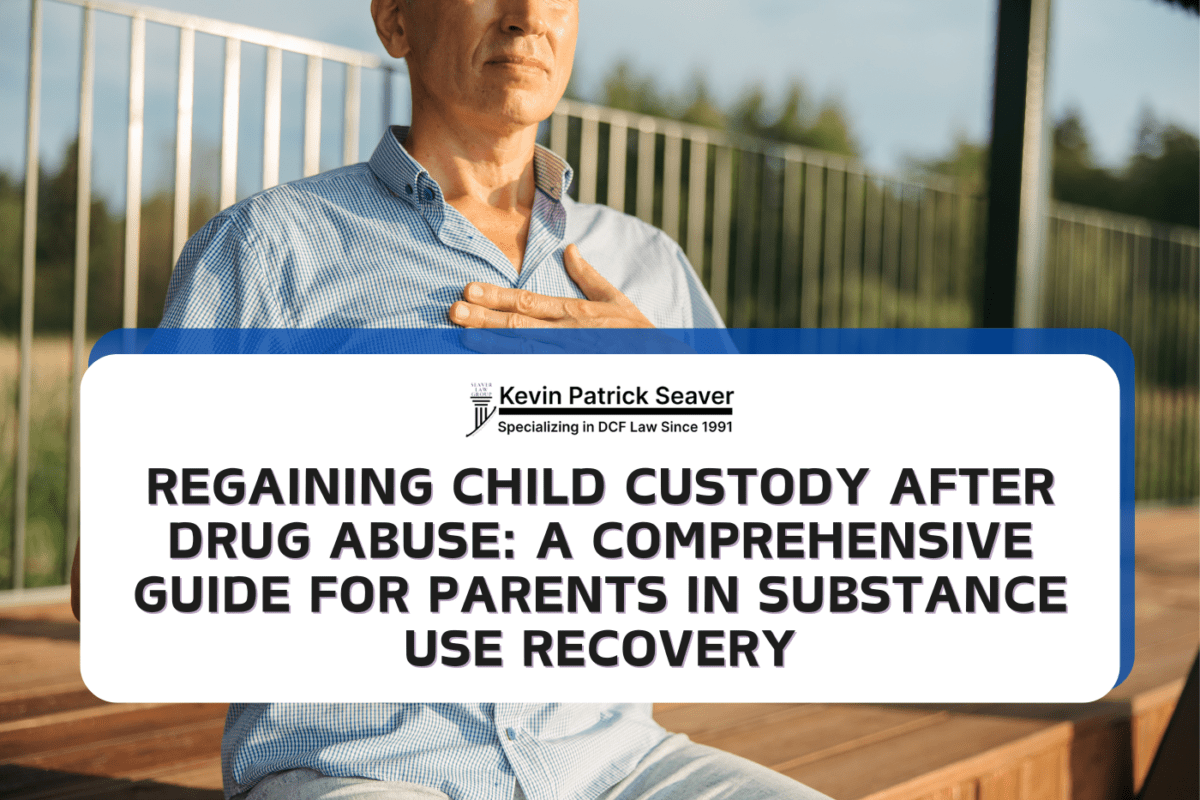Regaining Child Custody After Drug Abuse: A Comprehensive Guide for Parents in Substance Use Recovery
Alt txt: Regaining Child Custody After Drug Abuse
When facing the daunting challenge of regaining custody after drug abuse, many parents feel like they are battling not only their personal demons but also the imposing scrutiny of the Department of Children and Families (DCF).
Imagine being a parent who has stumbled, yet you’re fighting tooth and nail to stitch your family back together. In this critical fight, DCF often appears as an imposing barrier rather than a helping hand. In this article, we’ll explore the best ways to regain custody after drug abuse, offering a beacon of hope and practical advice to parents navigating this tough journey.
This guide is designed to arm you with knowledge and tools, making you the hero of your own story, with the law as your shield and expert guidance as your sword.
Continue reading to discover how you can rebuild your family’s future, starting with the steps and support you need to regain custody and bring your children home. This isn’t just about legal battles; it’s about laying down a path to recovery and reconciliation.
Understanding the Impact of Drug Abuse on Family
Dynamics
Drug abuse can deeply affect a family, making it hard for parents to take care of their kids properly. In Massachusetts, the Department of Children and Families (DCF) steps in to make sure kids are safe if a parent has a problem with drugs or alcohol.
Parents who are fighting addiction often face tough challenges in keeping or getting back custody of their children. To improve their chances, parents need to show they are working hard to get better by joining drug rehab programs and attending regular treatment sessions.
Legal Framework for Child Custody and Recovery

In Massachusetts, the approach to child custody is fundamentally centered on the best interests of the child, particularly when substance abuse is involved. The DCF takes a rigorous stance in these cases, conducting detailed assessments to ensure that the living environment fostered by the recovering parent
promotes safety, stability, and the overall well-being of the child.
Understanding the criteria and benchmarks used by DCF in these evaluations is crucial for any parent seeking to regain custody after drug abuse. This section will elucidate these legal stipulations and the judicial perspective on child welfare, which prioritizes maintaining a harm-free environment for the child.
Key Factors Considered by DCF
When the DCF evaluates whether a parent can regain custody of a child, they carefully assess several key factors. Understanding these factors can help parents effectively navigate their custody case:
- Home Stability: DCF checks if the home is safe and suitable for children. This includes ensuring the home environment protects the child from potential abuse or neglect.
- Regular Rehab Attendance: Attending substance abuse treatment consistently shows commitment to overcoming drug or alcohol addiction. This is a crucial step to regain custody and demonstrates serious efforts to stay clean.
- Support Groups and Aftercare: Participation in support groups like Alcoholics Anonymous is key. It shows ongoing engagement in activities designed to help maintain sobriety and manage substance abuse problems.
Proof of Being Drug-Free: Drug screenings provide concrete evidence of sobriety. Regular, clean test results build trust with DCF and support claims of recovery from alcohol or drug abuse. - Taking Care of Children’s Needs: DCF evaluates whether a parent can meet the emotional, physical, and educational needs of their child, ensuring the child’s best interest is always a priority.
- Understanding Custody Types: It’s important for parents to understand different forms of custody, such as sole custody, joint custody, and joint legal custody, and how they affect the time with your child.
- Knowing Court Rules: Familiarity with family court processes and custody orders can significantly impact the outcome of custody battles.
- Effect of Substance Abuse on Parenting: DCF assesses how a parent’s substance abuse may have impacted the child. They focus on ensuring that the child’s safety and well-being are not compromised due to addiction.
- Working with Child Protective Services: Cooperation with DCF and understanding the steps to regain custody are vital. Following their guidelines can greatly improve the likelihood of custody restoration.
- Past Drug Use and Mental Health: DCF considers the parent’s history with drug or alcohol abuse and any related mental health services they’ve received. Effective management of these issues through a treatment center can positively influence the custody decision.
By highlighting these considerations and grounding the discussion in actionable steps and supportive resources, parents can better prepare for the complexities of regaining custody after battling substance abuse.
Best Ways to Demonstrate Commitment to Substance Recovery
When attempting to regain custody after drug abuse, showing a consistent commitment to recovery is crucial. This commitment serves as a tangible indicator to Child Protective Services (CPS) and the family court system of your dedication to maintaining a stable environment for your children.
It’s important to understand that proving your sobriety goes beyond passing drug screenings; it encompasses a comprehensive lifestyle change aimed at long-term sobriety and responsible parenting.
A more long-term approach includes maintaining consistent participation in drug rehab programs and being proactive in seeking out substance abuse treatment that addresses the root causes of addiction.
In Massachusetts, where rates of substance use disorder are a significant concern, demonstrating a clear break from past behaviors by actively engaging in a treatment program can be persuasive in legal custody discussions.
Statistics show that engaged and proactive recovery efforts significantly improve outcomes in custody cases involving substance use disorders.
Building a Support Network
Developing a robust support network is an integral part of the recovery process and crucial when you are seeking to regain custody or maintain child custody. This network should include not only close friends and family but also professionals like counselors and social workers who specialize in substance use disorders.
In Massachusetts, where family and community ties are often highlighted in child welfare considerations, demonstrating strong community and familial connections can be a significant factor in custody evaluations.
Maintaining such a network will show the court that the parents have the emotional and practical support needed to navigate the challenges of parenting and maintaining sobriety. For instance, a parent might rely on family members to help with transportation to and from rehab centers or to step in when childcare conflicts arise.
Support groups like Alcoholics Anonymous (AA) or Narcotics Anonymous (NA) also play a crucial role,
offering a community of individuals who understand the struggles and can offer real-time support and accountability, which is vital for someone working to stay sober and regain child custody.
Engaging with Professional Help
Engagement with professional help is a cornerstone of demonstrating your commitment to recovery and the well-being of your child. Regular attendance at counseling sessions and addiction treatment programs not only supports your recovery but also documents your efforts to overcome drug or alcohol addiction.
This documented commitment is crucial during custody evaluations and can influence the court’s decision on legal custody or joint legal custody arrangements.
In Massachusetts, courts consider a parent’s willingness to seek and continue treatment as a significant factor in determining child custody outcomes.
The involvement of professionals in your recovery process provides an authoritative endorsement of your progress and commitment. It’s advisable to maintain a record of all interactions with healthcare providers, including substance abuse counselors and mental health professionals, as these documents can be invaluable in custody hearings.
This level of engagement shows the court that you are taking all necessary steps to ensure a safe and stable environment for your children, enhancing your profile as a responsible parent seeking to protect and provide for your child’s best interests.
Strategies for Positive Communication with DCF

Effective communication with DCF is pivotal in shaping their perception of your dedication and advancement in recovery. Being forthright, cooperative, and proactive in your interactions with DCF representatives is crucial. It’s essential to demonstrate that you understand the gravity of the situation and are committed to creating a nurturing environment for your children.
Preparing for Home Visits
Home visits by DCF are integral to the custody assessment process, serving as a direct insight into your daily living conditions and parenting practices. To prepare, ensure that your home environment is not only safe but also stable and child-friendly.
This preparation shows your readiness to provide a suitable environment for your children. Simple steps like maintaining cleanliness, securing hazardous items, and setting up appropriate sleeping arrangements for each child can significantly impact the DCF’s assessment. In Massachusetts, where family welfare standards are stringently upheld, these home visits can make or break your pursuit to regain custody.
Documenting Your Recovery Journey
Maintaining a detailed log of your recovery and parenting activities is crucial. This log should include entries on your rehab attendance, substance abuse treatment sessions, and any drug or alcohol screenings.
Moreover, documenting interactions with your child, such as attendance at school events or doctor’s appointments, reinforces your active role as a parent.
This comprehensive approach not only supports your case in family court but also serves as a testament to your commitment to maintaining sobriety and regaining custody. In Massachusetts, where the rate of substance abuse may influence custody decisions, such detailed records are invaluable.
These strategies are designed to strengthen your position in a custody case, emphasizing a proactive and committed approach to overcoming challenges related to substance abuse. By adhering to these guidelines, you can enhance your likelihood of a favorable outcome in regaining custody, ensuring your child’s safety and well-being remain the priority.
Navigating Child Custody Hearings with Confidence
Custody hearings are key for parents trying to regain custody after drug abuse. These hearings can be scary, but being well-prepared helps you make a strong case. It’s important to show the judge that you are a safe and stable parent. In Massachusetts, courts take child safety very seriously. They want to see that you are committed to staying sober and taking good care of your child.
Legal Representation and Advice
Hiring a good lawyer who knows a lot about family law in Massachusetts can really help your case. A skilled lawyer knows how to handle the tough parts of the law and can speak up for you in court.
They will make sure the judge sees all the hard work you’ve done to overcome addiction and provide a good home for your children.
Having a lawyer is not just about support in court; it’s about using their knowledge to keep your rights and get the best result for your family.
Here are some tips on how to use a lawyer effectively:
- Show Proof of Your Recovery: Your lawyer should show clear evidence that you are sober. This
includes drug tests, records from rehab programs, and letters from doctors.
- Prove You’re a Good Parent: Show that you’re involved in your child’s life. This could be going to school events, taking care of their health, and spending time with them every day.
- Address Any Problems Head-On: Your lawyer can answer any worries the court might have about you as a parent. They will show that you’re doing everything you can to be safe and responsible.
- Understand Different Custody Types: Learn about different custody arrangements, like shared custody or full custody, and what they mean for you and your child.
Using these strategies will help you feel more prepared and confident at your custody hearing. With the right legal help and careful planning, you can show the court that you’re dedicated to being a great parent and that you deserve to be with your child.
Key Takeaways
In conclusion, regaining custody after drug abuse is a challenging journey that requires dedication, careful planning, and effective legal representation. By employing the best ways to regain custody after drug abuse, such as maintaining a sober lifestyle, actively participating in your child’s life, and preparing thoroughly for custody hearings, you can significantly improve your chances of reuniting with your children.
These strategies, rooted in a deep understanding of the legal nuances surrounding child custody cases in Massachusetts, provide a solid foundation for parents striving to turn their lives around and ensure the well-being of their families.
Remember, while the road to recovery and regaining custody can be arduous, you are not alone in this fight. Whether you are dealing with substance abuse treatment, navigating child protective services, or seeking legal custody, there is hope and help available.
Start Your Journey to Custody Recovery with the Law Office of Kevin Seaver
Are you striving to navigate the complexities of regaining custody after overcoming drug abuse? At the Law Office of Kevin Seaver, we understand the sensitivity and urgency of your situation.
Specializing in DCF investigations, assessments, and fair hearings, we are committed to turning your DCF negatives into positives. Our experienced legal team is ready to guide you through each step of the custody recovery process, ensuring you have the strongest possible representation.
DISCLAIMER
You find yourself in this situation, it’s advisable to seek legal representation from a qualified attorney, like those at the Law Office of Kevin Seaver, who can advocate for your rights and guide you through the complex process of a DCF investigation.
Remember that the ultimate goal of DCF is to ensure the safety and well-being of children while supporting families in crisis.
Please note that this article does not create an Attorney-Client relationship between our law firm and the reader and is provided for informational purposes only. Information in this article does not apply to all readers.
Readers should not rely on this information as legal advice and should seek specific counsel from the attorney based on personal circumstances. Thank you.
Kevin Patrick Seaver is a Massachusetts DCF Defense Lawyer who represents parents against false child abuse allegations.

Massachusetts DCF Defense Lawyer Kevin Seaver has been successfully fighting false child abuse allegations since 1991.


